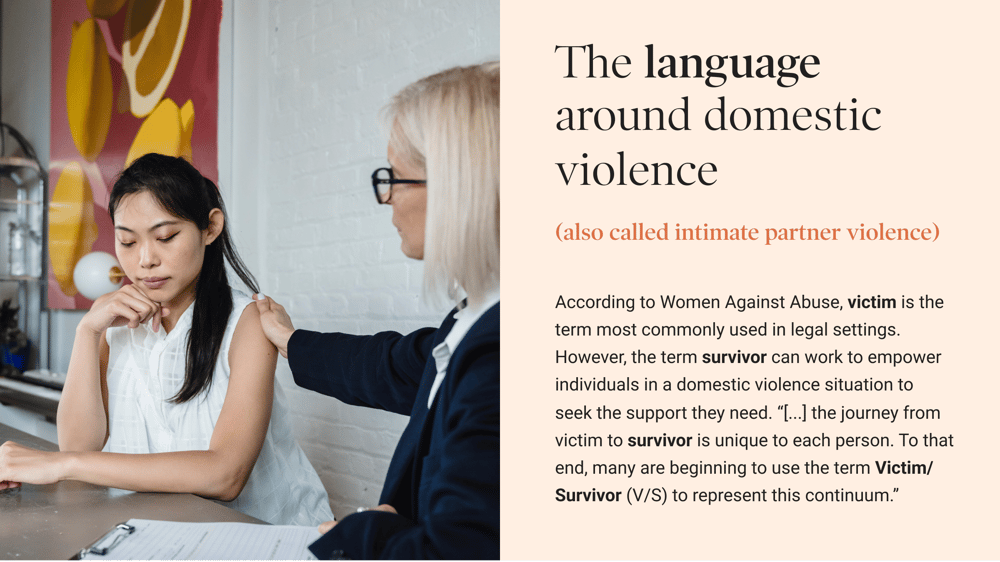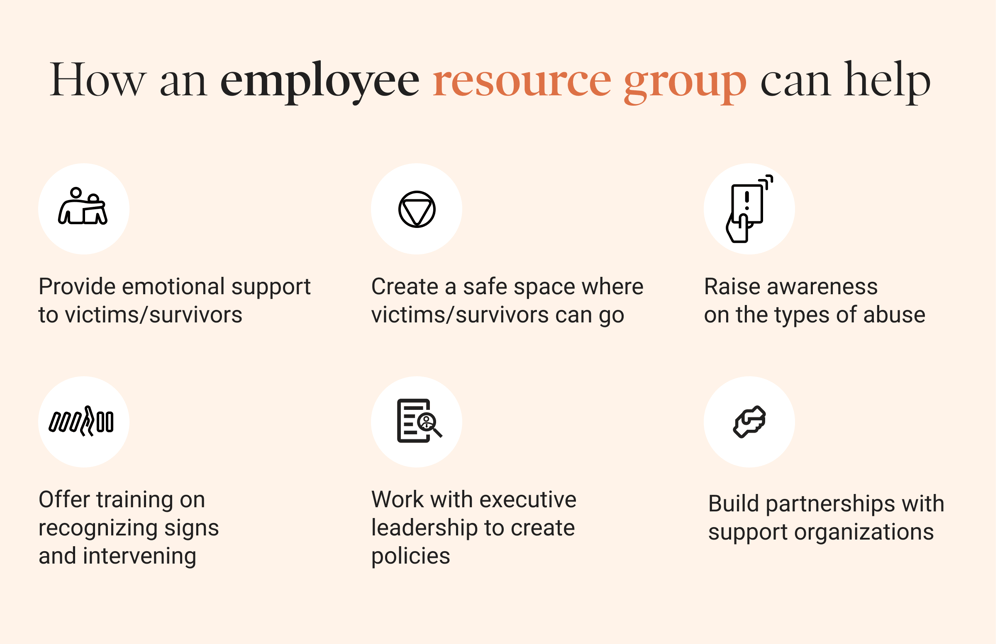The short answer is yes. But the long answer is a bit more complicated. In 2019, a total of 85,169 Canadian women and 22,741 men reported some form of domestic violence. Many victims and survivors also take the physical and emotional toll of abuse to work every day. In fact, over a third of employees believe they know at least one colleague who has experienced or is currently living with abuse. Even if it doesn’t begin in the workplace, domestic abuse can lead to disengagement, anxiety, fatigue, poor performance, absenteeism, and more.

If you suspect your colleague or employee is experiencing domestic violence, you might be unsure how to best support them. Abuse is an isolating experience, and the victim/survivor may feel scared or ashamed. However, they’re not alone, and there are steps you can take to help them feel supported.

Recognizing the signs of domestic violence
Domestic violence can take many forms, including:
-
Physical abuse
-
Emotional or psychological abuse
-
Financial abuse
-
Neglect
-
Sexual abuse
While some signs of abuse can be obvious, like severe behavioural changes, bruises, or injuries, other signs are subtle. Notice if your team member is:
-
Quieter than usual or withdrawn
-
Frequently absent from work
-
Less productive or engaged
-
Dealing with significant weight gain or weight loss
-
Nervous or anxious
-
Tired or sleep-deprived
-
Dishevelled or less put-together
If you notice any of these signs in a team member, take time to speak with them privately.
Knowing how to help someone in need
If your colleague opens up to you about their experience with domestic violence, the first step is to listen. Make sure they know that you believe them. Statements like these can feel reassuring and reinforce trust:
-
You don’t deserve what happened to you.
-
This is not your fault.
-
You’re not alone.
Other statements may further isolate your team member. Stay away from comments that invalidate their experience, express disbelief, or condemn their inaction:
-
I can’t believe you put up with this!
-
Your partner just doesn’t seem like that kind of person.
-
If you’re still with them, it must not be that bad.
-
You can’t stay in this situation.
Your team member or employee might not feel physically or financially able to leave the situation they’re in, but they may need practical assistance. Here are simple ways you can be there for them.
As a colleague:
-
Offer to carpool together.
-
Ask if you can pitch in on big work projects.
-
Invite them to do activities outside the house.
-
Gather resources available in your area and share them.
As a manager:
-
Provide flexible scheduling and work-from-home options.
-
Discuss paid leave options if available.
-
Offer to lighten their workload.
-
Refer them to employee benefits resources that can support them.
Creating a safe space at work
It’s important that your team member feels safe confiding in you. Avoid judgment and show empathy. If your workplace doesn’t already have an employee resource group devoted to domestic violence awareness and prevention, see if you can create one. If joining an existing group isn’t possible or desirable for your colleague, see if there are other ways you can support them from within the group.

Defining a policy on domestic abuse in the workplace
A policy on domestic violence can help provide structure, support, and protection for employees who may be experiencing abuse. The policy should outline the procedures for reporting abuse, and identify resources that are available to employees. For example, some employers may allow employees to take paid or unpaid leave if they need time to deal with the aftermath of abuse. Others may allow flexible work schedules or locations so that employees can stay safe. Encouraging your employer to implement policies like these can make a big difference for team members who are dealing with domestic violence.
How Dialogue can help
Employee Assistance Program
Domestic violence situations often surface a slew of financial or legal concerns. Through Dialogue’s Employee Assistance Program, certified financial planners and lawyers can support victims/survivors with questions and help them find external resources if needed.
Mental Health
Stress, anxiety, and isolation are common reactions to intimate partner violence, and many people struggle to cope with the trauma long after they have left the abusive relationship. Through Dialogue’s Mental Health+ program, victims/survivors can find the support and resources they need to begin managing negative feelings. Our mental health specialists can also provide support for evaluation and navigation to external services.
If you or someone you know is in immediate danger, please call 911.
Find crisis lines, sexual assault centres, and support services here.
Use your postal code to find additional local resources here.
Sources:




 Canada (EN)
Canada (EN)
 Global (EN)
Global (EN)







